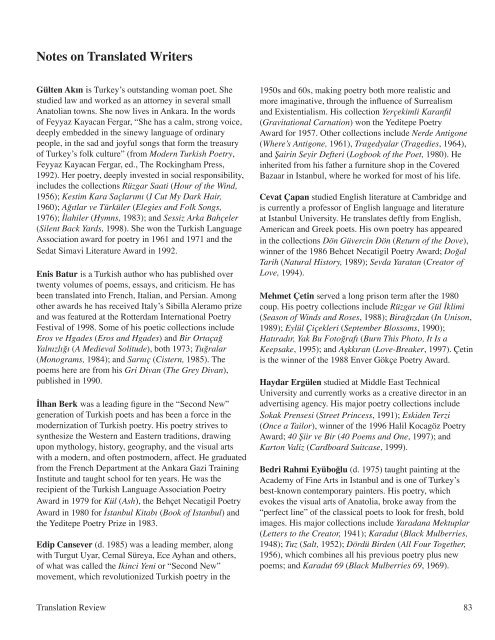Translation Review - The University of Texas at Dallas
Translation Review - The University of Texas at Dallas
Translation Review - The University of Texas at Dallas
You also want an ePaper? Increase the reach of your titles
YUMPU automatically turns print PDFs into web optimized ePapers that Google loves.
Notes on Transl<strong>at</strong>ed Writers<br />
Gülten Akın is Turkeyʼs outstanding woman poet. She<br />
studied law and worked as an <strong>at</strong>torney in several small<br />
An<strong>at</strong>olian towns. She now lives in Ankara. In the words<br />
<strong>of</strong> Feyyaz Kayacan Fergar, “She has a calm, strong voice,<br />
deeply embedded in the sinewy language <strong>of</strong> ordinary<br />
people, in the sad and joyful songs th<strong>at</strong> form the treasury<br />
<strong>of</strong> Turkeyʼs folk culture” (from Modern Turkish Poetry,<br />
Feyyaz Kayacan Fergar, ed., <strong>The</strong> Rockingham Press,<br />
1992). Her poetry, deeply invested in social responsibility,<br />
includes the collections Rüzgar Sa<strong>at</strong>i (Hour <strong>of</strong> the Wind,<br />
1956); Kestim Kara Saçlarımı (I Cut My Dark Hair,<br />
1960); Ağıtlar ve Türküler (Elegies and Folk Songs,<br />
1976); İlahiler (Hymns, 1983); and Sessiz Arka Bahçeler<br />
(Silent Back Yards, 1998). She won the Turkish Language<br />
Associ<strong>at</strong>ion award for poetry in 1961 and 1971 and the<br />
Sed<strong>at</strong> Simavi Liter<strong>at</strong>ure Award in 1992.<br />
Enis B<strong>at</strong>ur is a Turkish author who has published over<br />
twenty volumes <strong>of</strong> poems, essays, and criticism. He has<br />
been transl<strong>at</strong>ed into French, Italian, and Persian. Among<br />
other awards he has received Italyʼs Sibilla Aleramo prize<br />
and was fe<strong>at</strong>ured <strong>at</strong> the Rotterdam Intern<strong>at</strong>ional Poetry<br />
Festival <strong>of</strong> 1998. Some <strong>of</strong> his poetic collections include<br />
Eros ve Hgades (Eros and Hgades) and Bir Ortaçağ<br />
Yalnızlığı (A Medieval Solitude), both 1973; Tuğralar<br />
(Monograms, 1984); and Sarnıç (Cistern, 1985). <strong>The</strong><br />
poems here are from his Gri Divan (<strong>The</strong> Grey Divan),<br />
published in 1990.<br />
İlhan Berk was a leading fi gure in the “Second New”<br />
gener<strong>at</strong>ion <strong>of</strong> Turkish poets and has been a force in the<br />
moderniz<strong>at</strong>ion <strong>of</strong> Turkish poetry. His poetry strives to<br />
synthesize the Western and Eastern traditions, drawing<br />
upon mythology, history, geography, and the visual arts<br />
with a modern, and <strong>of</strong>ten postmodern, affect. He gradu<strong>at</strong>ed<br />
from the French Department <strong>at</strong> the Ankara Gazi Training<br />
Institute and taught school for ten years. He was the<br />
recipient <strong>of</strong> the Turkish Language Associ<strong>at</strong>ion Poetry<br />
Award in 1979 for Kül (Ash), the Behçet Nec<strong>at</strong>igil Poetry<br />
Award in 1980 for İstanbul Kitabı (Book <strong>of</strong> Istanbul) and<br />
the Yeditepe Poetry Prize in 1983.<br />
Edip Cansever (d. 1985) was a leading member, along<br />
with Turgut Uyar, Cemal Süreya, Ece Ayhan and others,<br />
<strong>of</strong> wh<strong>at</strong> was called the Ikinci Yeni or “Second New”<br />
movement, which revolutionized Turkish poetry in the<br />
1950s and 60s, making poetry both more realistic and<br />
more imagin<strong>at</strong>ive, through the infl uence <strong>of</strong> Surrealism<br />
and Existentialism. His collection Yerçekimli Karanfi l<br />
(Gravit<strong>at</strong>ional Carn<strong>at</strong>ion) won the Yeditepe Poetry<br />
Award for 1957. Other collections include Nerde Antigone<br />
(Whereʼs Antigone, 1961), Tragedyalar (Tragedies, 1964),<br />
and Şairin Seyir Defteri (Logbook <strong>of</strong> the Poet, 1980). He<br />
inherited from his f<strong>at</strong>her a furniture shop in the Covered<br />
Bazaar in Istanbul, where he worked for most <strong>of</strong> his life.<br />
Cev<strong>at</strong> Çapan studied English liter<strong>at</strong>ure <strong>at</strong> Cambridge and<br />
is currently a pr<strong>of</strong>essor <strong>of</strong> English language and liter<strong>at</strong>ure<br />
<strong>at</strong> Istanbul <strong>University</strong>. He transl<strong>at</strong>es deftly from English,<br />
American and Greek poets. His own poetry has appeared<br />
in the collections Dön Güvercin Dön (Return <strong>of</strong> the Dove),<br />
winner <strong>of</strong> the 1986 Behcet Nec<strong>at</strong>igil Poetry Award; Doğal<br />
Tarih (N<strong>at</strong>ural History, 1989); Sevda Yar<strong>at</strong>an (Cre<strong>at</strong>or <strong>of</strong><br />
Love, 1994).<br />
Mehmet Çetin served a long prison term after the 1980<br />
coup. His poetry collections include Rüzgar ve Gül İklimi<br />
(Season <strong>of</strong> Winds and Roses, 1988); Birağızdan (In Unison,<br />
1989); Eylül Çiçekleri (September Blossoms, 1990);<br />
H<strong>at</strong>ıradır, Yak Bu Fotoğrafı (Burn This Photo, It Is a<br />
Keepsake, 1995); and Aşkkıran (Love-Breaker, 1997). Çetin<br />
is the winner <strong>of</strong> the 1988 Enver Gökçe Poetry Award.<br />
Haydar Ergülen studied <strong>at</strong> Middle East Technical<br />
<strong>University</strong> and currently works as a cre<strong>at</strong>ive director in an<br />
advertising agency. His major poetry collections include<br />
Sokak Prensesi (Street Princess, 1991); Eskiden Terzi<br />
(Once a Tailor), winner <strong>of</strong> the 1996 Halil Kocagöz Poetry<br />
Award; 40 Şiir ve Bir (40 Poems and One, 1997); and<br />
Karton Valiz (Cardboard Suitcase, 1999).<br />
Bedri Rahmi Eyüboğlu (d. 1975) taught painting <strong>at</strong> the<br />
Academy <strong>of</strong> Fine Arts in Istanbul and is one <strong>of</strong> Turkeyʼs<br />
best-known contemporary painters. His poetry, which<br />
evokes the visual arts <strong>of</strong> An<strong>at</strong>olia, broke away from the<br />
“perfect line” <strong>of</strong> the classical poets to look for fresh, bold<br />
images. His major collections include Yaradana Mektuplar<br />
(Letters to the Cre<strong>at</strong>or, 1941); Karadut (Black Mulberries,<br />
1948); Tuz (Salt, 1952); Dördü Birden (All Four Together,<br />
1956), which combines all his previous poetry plus new<br />
poems; and Karadut 69 (Black Mulberries 69, 1969).<br />
<strong>Transl<strong>at</strong>ion</strong> <strong>Review</strong> 83

















